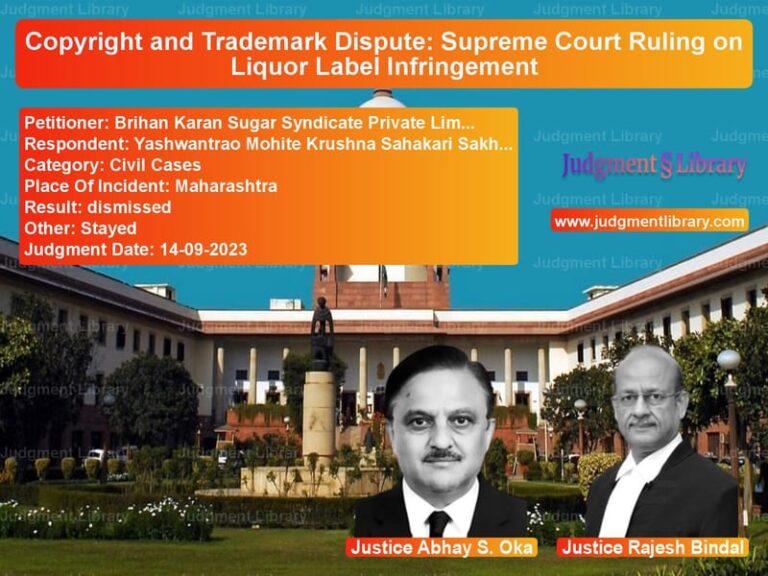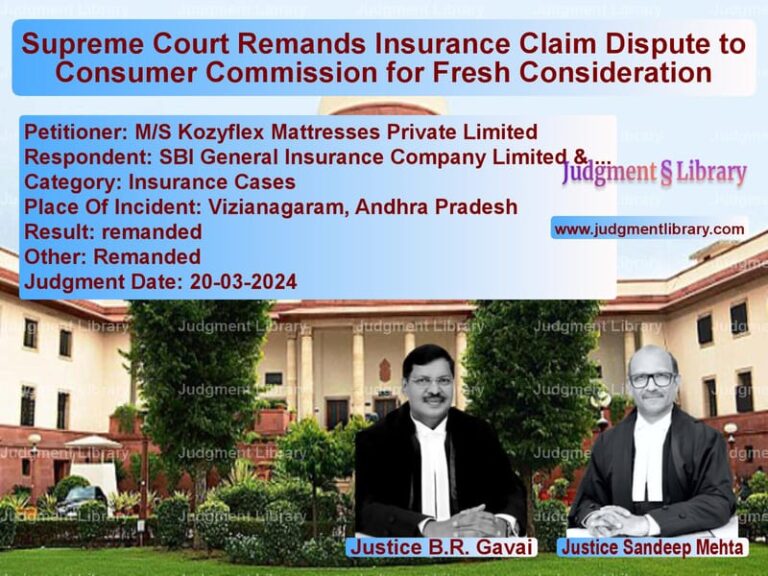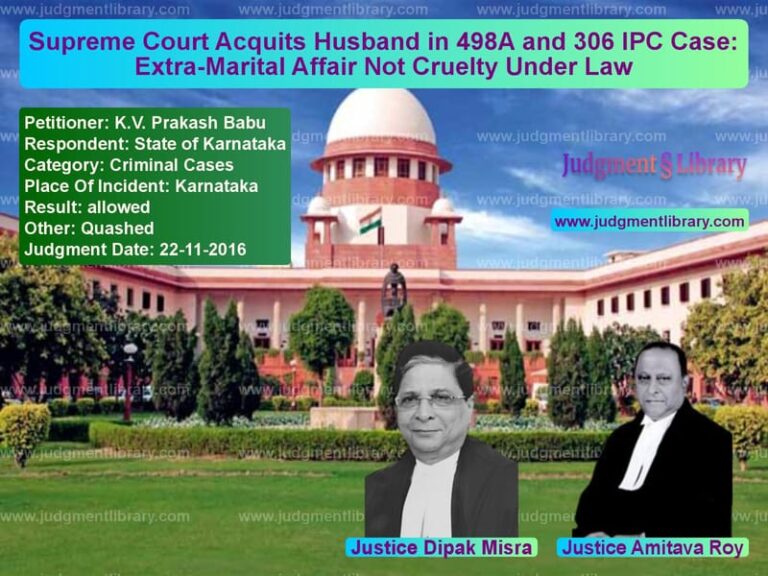Supreme Court Rules on Interstate Bus Permit Dispute: Ambala Bus Syndicate v. Chandigarh Administration
On 26th September 2018, the Supreme Court of India delivered a crucial judgment in the case of Ambala Bus Syndicate Pvt. Ltd. v. Chandigarh Administration & Ors.. This case revolved around the **interstate bus permit issue**, where a private bus operator sought permission to operate beyond the Punjab territory into **Union Territory (UT) Chandigarh**.
The Supreme Court overturned the Punjab and Haryana High Court’s ruling, upholding the validity of a **reciprocal transport agreement** between Punjab and Chandigarh. The ruling established that the **reciprocal agreement of 2008 took precedence** over the 1998 Scheme, allowing the bus operator to continue operating within Chandigarh.
Background of the Case
The case originated when **Ambala Bus Syndicate Pvt. Ltd.**, a private operator, contested the High Court’s decision that restricted its **stage carriage operations beyond Punjab** under the 1998 Transport Scheme. The High Court held that private non-air-conditioned buses were **not permitted to operate in UT Chandigarh**, citing the **Motor Vehicles Act, 1988 (MV Act)**.
However, the appellant argued that the **reciprocal transport agreement** of 2008 between **Punjab and Chandigarh** explicitly allowed private bus operators to ply within Chandigarh’s limits.
Key Legal Issues Considered
The Supreme Court examined the following legal questions:
- Did the 1998 **Transport Scheme** override the **2008 reciprocal agreement**?
- Could **private bus operators claim counter-signatures on permits** to operate within Chandigarh?
- Was there a conflict between the **Motor Vehicles Act provisions** and the **reciprocal agreement**?
Arguments by the Petitioner (Ambala Bus Syndicate Pvt. Ltd.)
The appellant, through its counsel, argued:
- The **reciprocal agreement of 2008** explicitly permitted **counter-signatures for private bus operators** to operate in Chandigarh.
- The 1998 Scheme **could not supersede the later 2008 agreement**, which was mutually agreed upon by both states.
- The company had **historically operated its buses under permits issued before 1966**, and these permits were still valid.
- The Chandigarh Administration’s refusal to **counter-sign the permits** was in violation of the **Motor Vehicles Act, 1988 (MV Act)**.
Arguments by the Respondent (Chandigarh Administration & Ors.)
The Chandigarh Administration, through its counsel, countered with the following points:
- The 1998 **Transport Scheme**, as modified in 2001, **excluded private operators from operating in UT Chandigarh**.
- Section **66 of the MV Act, 1988** required **permits to be counter-signed** by the competent authority, and Chandigarh had the right to refuse.
- The reciprocal agreement **did not override the 1998 Scheme**, which was created under **Sections 99 and 100 of the MV Act**.
- The **State Transport Undertakings (STUs) had priority** over private operators in public transport within Chandigarh.
Supreme Court’s Observations
The Supreme Court, comprising **Justice Kurian Joseph and Justice Sanjay Kishan Kaul**, reviewed the reciprocal agreement and the Motor Vehicles Act provisions.
On the applicability of the reciprocal agreement:
“Despite the 1998 Transport Scheme, the 2008 reciprocal agreement explicitly allowed private operators to function within Chandigarh. The High Court failed to consider this.”
On the supremacy of the 2008 agreement over the 1998 Scheme:
“Unless the reciprocal agreement is superseded by a fresh agreement or a new transport scheme, private operators cannot be denied counter-signatures.”
On the legal consistency of the reciprocal agreement:
“There is no conflict between Section 98 of the MV Act and the reciprocal agreement. The agreement is on mutually beneficial terms and must be upheld.”
Final Judgment
After careful consideration, the Supreme Court ruled:
- The 2008 **reciprocal agreement remains valid** and **cannot be nullified by the 1998 Transport Scheme**.
- Chandigarh Administration **must counter-sign permits for private operators** in accordance with the agreement.
- The decision of the **Division Bench of the High Court was set aside**, restoring the earlier judgment of the **Single Judge Bench**.
- The Chandigarh Administration was directed to **take action within four weeks** to implement the ruling.
Impact of the Judgment
The Supreme Court’s ruling in this case has major implications for **interstate transport law and regulatory frameworks**:
- Ensuring fairness in transport agreements: Reciprocal agreements between states **must be honored unless formally superseded**.
- Balancing public and private transport: Private bus operators cannot be **arbitrarily excluded** when agreements permit their operation.
- Legal clarity on permit counter-signatures: The **Motor Vehicles Act, 1988**, allows counter-signatures when **valid agreements exist**.
- Strengthening contractual obligations between states: Interstate agreements **have legal enforceability** and cannot be ignored.
This ruling ensures that **private bus operators are not unfairly denied access to routes**, while reaffirming that **reciprocal transport agreements hold legal weight**. It strengthens **legal consistency in interstate transport law**, making it a landmark judgment for both public and private transport stakeholders.
Petitioner Name: Ambala Bus Syndicate Pvt. Ltd..Respondent Name: Chandigarh Administration & Ors..Judgment By: Justice Kurian Joseph, Justice Sanjay Kishan Kaul.Place Of Incident: Chandigarh.Judgment Date: 26-09-2018.
Don’t miss out on the full details! Download the complete judgment in PDF format below and gain valuable insights instantly!
Download Judgment: Ambala Bus Syndicate vs Chandigarh Administr Supreme Court of India Judgment Dated 26-09-2018.pdf
Direct Downlaod Judgment: Direct downlaod this Judgment
See all petitions in Contract Disputes
See all petitions in Public Interest Litigation
See all petitions in Consumer Rights
See all petitions in Judgment by Kurian Joseph
See all petitions in Judgment by Sanjay Kishan Kaul
See all petitions in allowed
See all petitions in Modified
See all petitions in supreme court of India judgments September 2018
See all petitions in 2018 judgments
See all posts in Civil Cases Category
See all allowed petitions in Civil Cases Category
See all Dismissed petitions in Civil Cases Category
See all partially allowed petitions in Civil Cases Category







